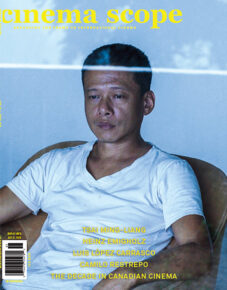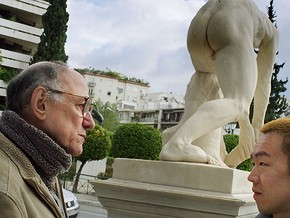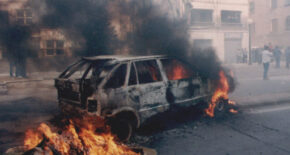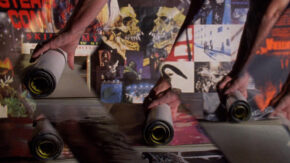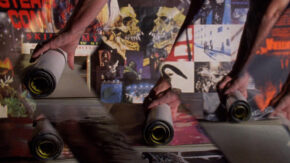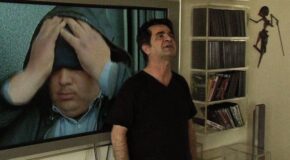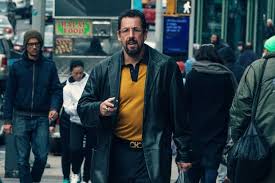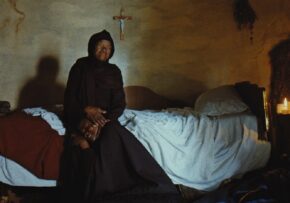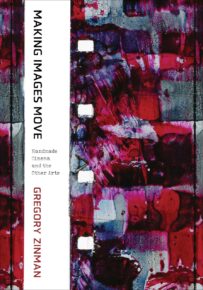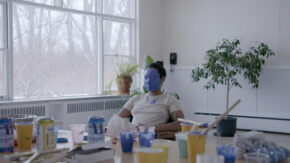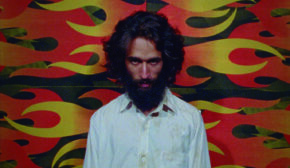CS82
Cinema Scope 82: Table of Contents
By Cinema Scope | 03/20/2020 | CS82, From Cinema Scope Magazine, Table of Contents
Interviews A State of Uncertainty: Tsai Ming-liang on Days by Darren Hughes New Possible Realities: Heinz Emigholz on The Last City by Jordan Cronk This Dream Will Be Dreamed Again: Luis López Carrasco’s El año del descubrimiento by James Lattimer Out of the Inkwell: Kim Deitch on Reincarnation Stories by Sean Rogers Features Impresión de un…
Read More → A State of Uncertainty: Tsai Ming-liang on Days
By Darren Hughes | 03/20/2020 | CS82, From Cinema Scope Magazine, Interviews
There’s no exact precedent for the long creative collaboration between Tsai Ming-liang and Lee Kang-sheng. In 1991, as the story goes, Tsai stepped out of a screening of a David Lynch movie and spotted Lee sitting on a motorbike outside of an arcade.
Read More → New Possible Realities: Heinz Emigholz on The Last City
By Jordan Cronk | 03/20/2020 | CS82, From Cinema Scope Magazine, Interviews
The Last City, the new film by Heinz Emigholz, begins with a confession. “And it was a straight lie when I told you that I had an image that could describe the state of my depression,” admits a middle-aged archaeologist to a weapons designer (played, respectively, by John Erdman and Jonathan Perel, who were previously seen in Emigholz's 2017 film Streetscapes [Dialogue] as a filmmaker and his analyst). “I made that up.” Part reintroduction, part recapitulation, this abrupt admission sets the conceptual coordinates for a film that, despite its presentation and the familiarity of its players, is less a continuation of that earlier work’s confessional mode of address than a creative reimagining of its talking points.
Read More → This Dream Will Be Dreamed Again: Luis López Carrasco’s El año del descubrimiento
By James Lattimer | 03/20/2020 | CS82, From Cinema Scope Magazine, Interviews
Luis López Carrasco’s dense, devious El año del descubrimiento confirms his reputation as Spain’s foremost audiovisual chronicler of the country’s recent past, albeit one for whom marginal positions, materiality, everyday chitchat, and the liberating effects of fiction are as, if not more, important than grand historical events.
Read More → Long Live the New Flesh: The Decade in Canadian Cinema
By Adam Nayman | 03/20/2020 | Canadiana, CS82, From Cinema Scope Magazine
Let’s get it right out of the way: by any non-subjective metric—which is to say in spite of my own personal opinion—the Canadian filmmaker of the decade is Xavier Dolan, who placed six features (including two major Competition prizewinners) at Cannes between 2009 (let’s give him a one-year head start) and 2019, all before turning 30. Prodigies are as prodigies do, and debating Dolan’s gifts as a transnational melodramatist and zeitgeist-tapperis a mug’s game, one that I’ve already played in these pages.
Read More → Best of the Decade: Jodie Mack
By Sofia Bohdanowicz | 03/20/2020 | Canadiana, CS82, From Cinema Scope Magazine, Spotlight
The rigorous and vibrant visual rhythms of Jodie Mack’s cinema were first impressed upon me in 2009, when I premiered a short film at the Ann Arbor Film Festival in a section titled “Feminist Travelogues.” I was fortunate to have been programmed alongside Jodie, who was screening a 28-minute stop-motion animation musical epic titled Yard Work Is Hard Work (2008). During the screening I sat completely dazzled as I watched an intimidating wall of meticulously cut images pulled from catalogues perform intricate designs, which, in combination with acrobatic camera movements and an original soundtrack, told an allegorical story of the disillusionment of married life. I was overcome by the film: I found that it was suffused with an aura of isolation and defeat; it was impressively impenetrable.
Read More → Best of the Decade: Corneliu Porumboiu
By Antoine Bourges | 03/20/2020 | CS82, From Cinema Scope Magazine, Spotlight, The Decade In Review
In Porumboiu’s films, I see a connection to the use of “factual” elements in my own work. I often work with non-actors and have used re-enactments of what may seem like insignificant administrative protocols in a few of my films. In one particular instance, while interviewing a caseworker for a film project in Toronto, I came upon a type of document I had not seen before: a court referral for a man who was charged for refusing to appear in court after being caught stealing.
Read More → Best of the Decade: Jean-Luc Godard
By Andrea Bussmann | 03/20/2020 | Canadiana, CS82, From Cinema Scope Magazine
I initially wanted this piece to be about a writer—after all, are not images and words inseparable, delicately intertwined?—but I was gently nudged to stay focused on the image side of things. The task itself seemed like an impossible process of elimination, however, one that was finally alleviated only when I recalled the opening quotation published in this magazine in the article about my film Fausto (2018):
Read More → Best of the Decade: Sergei Loznitsa
By Atom Egoyan | 03/20/2020 | Canadiana, CS82, From Cinema Scope Magazine, Spotlight
I first encountered Sergei Loznitsa’s work at the Cannes Film Festival in 2010. Though I was busy watching student films and shorts as president of the Cinefondation jury, I found some time to steal away and watch some other work in the Official Selection. Loznitsa’s feature My Joy was in Competition.
Read More → Best of the Decade: Jafar Panahi
By Hugh Gibson | 03/20/2020 | Canadiana, CS82, From Cinema Scope Magazine, Spotlight, The Decade In Review
What would Harry Lime say about today? It feels like the time of the Borgias, but without the Renaissance. Oppression, trauma, and war are omnipresent—and that’s just on my list of the decade’s top films, which includes reflections on the scars left by conflicts past (Christian Petzold’s Transit, 2018; Miyazaki Hayao’s The Wind Rises, 2013; Ken Burns and Lynn Novick’s The Vietnam War, 2017), portraits of traumatized soldiers (Laurent Bécue-Renard’s Of Men and War, 2014; Valeska Grisebach’s Western, 2017; Paul Thomas Anderson’s The Master, 2012), and works that bear witness to atrocities (Wang Bing’s Dead Souls, 2019; Joshua Oppenheimer’s The Act of Killing, 2012,and The Look of Silence, 2014).
Read More → Cinema Scope 82: Editor’s Note — Best of the Decade
By Mark Peranson | 03/20/2020 | Columns, CS82, From Cinema Scope Magazine, Top Ten
And so goes the decade, and perhaps all of humanity as we know it—it was fun while it lasted. As a supplement to the Top Ten lists published here, which semi-scientifically summarize the privately expressed preferences of our regular contributors, I decided to do something a little different to glance back at the past ten years. By the time of publication you can find numerous examples of excellent writing on all of the films in our decade-end list, both in previous issues of Cinema Scope and also in other publications, in print and online, on the occasion of revisiting the past ten bountiful years in cinema.
Read More → Sundance: Power and Fear in Park City
By Robert Koehler | 03/20/2020 | Columns, CS82, Festivals, From Cinema Scope Magazine
Sundance equals power, and for a good reason: get your movie into the lineup, and you have an excellent chance of securing distribution in the US, a better chance by far than at any other festival. This means that it’s the supreme gateway, and despite or because of this fact, Sundance’s audiences are among the most conservative and rearguard in the international festival world.
Read More → Global Discoveries on DVD: Second Thoughts & Double Takes
By Jonathan Rosenbaum | 03/20/2020 | CS82, DVD Reviews, From Cinema Scope Magazine
I find it astonishing, really jaw-dropping, that Midge Costin’s mainly enjoyable Making Waves: The Art of Cinematic Sound (2019),available on aUK DVD on the Dogwoof label, can seemingly base much of its film history around a ridiculous falsehood: the notion that stereophonic, multi-track cinema wasinvented in the ’70s by the Movie Brats—basically Walter Murch, in concert with his chums George Lucas and Francis Ford Coppola—finally allowing the film industry to raise itself technically and aesthetically to the level already attained by The Beatles in music recording.
Read More → Exploded View | For a Cameraless Cinema: Making Images Move: Handmade Cinema and the Other Arts
By Chuck Stephens | 03/20/2020 | CS82, Exploded View, From Cinema Scope Magazine
By Chuck Stephens “That photography is not a prerequisite for handmade cinema’s production means that we can more easily come to view how artists used a variety of materials—not only paint, but also rain, oil, or electricity—as well as other media, technologies, and practices where cameras might be avoided, in order to pursue the goal…
Read More → Beanpole (Kantemir Balagov, Russia)
By Michael Sicinski | 03/20/2020 | CS82, Currency, From Cinema Scope Magazine
Kantemir Balagov’s debut feature Closeness (2017) garnered significant attention on the festival circuit, for reasons both positive and negative. Primarily a look at an insular Jewish community in a small town in the north Caucasus, the film institutes a tragedy that tests the bonds of immediate versus extended family.
Read More → And Then We Danced (Levan Akin, Sweden/Georgia/France)
By Katherine Connell | 03/20/2020 | CS82, Currency, From Cinema Scope Magazine
From drag performances to ballroom extravaganzas, booming club sequences to solitary swaying, queer cinema has often depicted moments of yearning or self-actualization through dance: think, for instance, of the erotic and essayistic function it serves in Isaac Julien’s Looking for Langston (1989),Edward and Gaveston’s spotlit slow dancing in Derek Jarman’s Edward II (1991), the adolescent hero’s furious romp through back allies and rooftops in Stephen Daldry’s Billy Elliot (2000),or the sublime hotel dance party to Rihanna’s “Diamonds” in Céline Sciamma’s Bande des filles (2014).
Read More → Discrete Charms: Rotterdam’s Tiger Short Competition
By Phil Coldiron | 03/20/2020 | CS82, Web Only
By Phil Coldiron We still have not found a satisfactory way to show new short films. The approach taken for the shorts competition at the International Film Festival Rotterdam—to treat ticketed programs as minimally thematic clusters of individual screenings, separated by a brief question and answer session with the filmmaker if present (and most were)—argues,…
Read More → Impresión de un cineasta: On the Films of Camilo Restrepo
By Jay Kuehner | 03/20/2020 | CS82, Features, From Cinema Scope Magazine
The title of Camilo Restrepo’s breakout short film, Impressions of a War (2015), suggests the anomalies inherent in conceiving of a historical portrait of modern Colombia. A war is not typically thought of as something that leaves an impression; rather, it maims, disables, obliterates, defaces, violates. Nor does its legacy register as a mere impression: the cumulative trauma amounts to nothing less than an indelible scar, both corporeal and psychological, that exceeds reason, conciliation, and memory.
Read More → 
